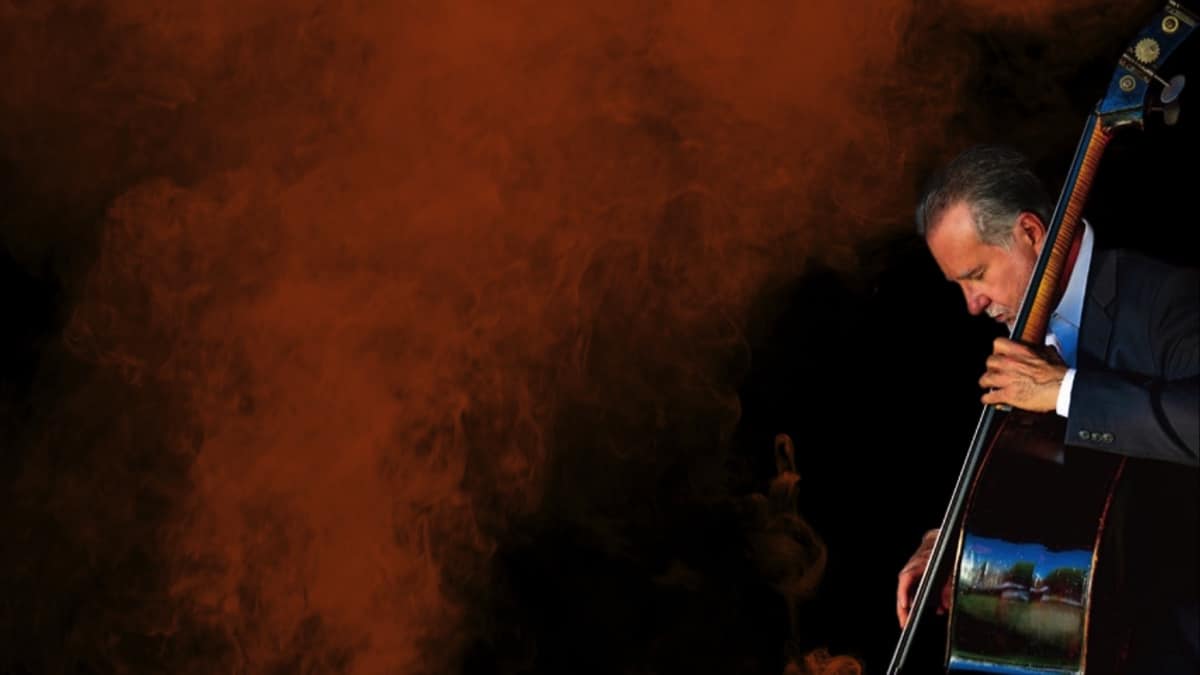Cover
Bassist and Composer Gary Willis: Bass Musician Magazine August/September 2007
Interview with Bassist Gary Willis –
Bassist and composer Gary Willis is one of the most respected names in the bass community. His innovative approach both compositionally as well as a player keeps him at the forefront of progressive music. His CD’s are a must listen to anyone looking to challenge their ear, as well as their musical outlook. Now residing in Spain, Gary talks about his latest CD’s, and shares some insight to his approach as a player and writer, and where things are heading.
Jake: One of the things I enjoy about your CD’s is I can always expect the unexpected from you, and after listening to Actual Fiction, you definitely did not let me down. Could you tell me about your approach to putting these tracks together?
Willis: It was the kind of thing where there wasn’t a record company involved, and I wasn’t in a position to do a traditional CD where you write some music, hire some musicians, hire a studio, go in and perform, and you’ve got that music that day with that performance. That was out of the question because there wasn’t a record company interested at the time.
So I’ve had the good fortune of working with Kirk Covington. He’s a real flexible musician, and so I flew him over and had him record on electronic drums. That gave the starting point for some of the tunes. So instead of doing traditional song forms, I took a more experimental approach, and I was more or less working on the final product the whole time as a result. There was a lot of trail and error, try this, try that, and it got even more experimental as we proceeded.
 Jake: Did you add all your sounds, voices, etc after all the tracks were down?
Jake: Did you add all your sounds, voices, etc after all the tracks were down?
Interview Photo Credits: Ferenc Sztraka
Willis: Smells Like A Party is a tune that generated those things, along with me and Kirk playing together. I had Mean Streak written before, but I really had no concept how it should sound, or what style it should be, so after spending time with Gomez on that track, we finally came up with version on the CD. It’s much heavier than I originally planned.
On Tio Loco, we came up with this feel, then I wrote a tune, and that was with Kirk.Based On A True Story was adapted to go on the CD. Eye Candy was based on a take from Kirk that I sped up to a different tempo, and then completed the track. Say Never I just did myself. I did PodCast myself, and imported and edited some of Gomez’s playing to complete that track. Kirk played on Cartoon Fetish, and that was one of the first tunes I worked on, and it went through a lot of revisions until I found what was going to be the focus.
Jake: After listening to Actual Fiction, and quite honestly most of your other works, I’m curious as to what goes thru your head, if anything, when your developing and creating new groove lines that I can always tell are distinctly yours.
Willis: Actually, coming up with groove lines on the bass is the easy thing for me, because it’s just instincts and creativity. That part is definitely easy. Coming up with the other elements, the drums, the percussion soundscape, these things are much more difficult.
What goes through my head is that there are certain things I want to say on the instrument, and I try to find a way to present it, or more importantly, justify it. You can’t just take off and go soloing; you have to create a context for that stuff to exist. It’s a lot of trial and error, and a lot of times it’s a lot of error. You have to try different things to find out what works, or doesn’t work, and that’s on all kinds of levels– working on editing drums, creating drum tracks and sounds so it doesn’t just sound like a loop, finding the right density, or finding the right harmony for the melody to keep focused.
 Jake: Improvisation has always been a stronghold for you on your recordings. Do you spend any time at all at this point investigating new ideas as far as improv goes.
Jake: Improvisation has always been a stronghold for you on your recordings. Do you spend any time at all at this point investigating new ideas as far as improv goes.
Willis: Not really. It’s more like different gigs, different situations will cause me to play different things, and it was the same for the CD. That was one of the reasons I had Kirk come over to get started. I wasn’t even sure if it was going to be a project. We tried some things to see if they would work and point me in a direction, and once the direction took hold, we got started.
On the other hand, Slaughterhouse 3 was a really good example of just pure improvisation. We set up and recorded for an afternoon, then came back and did a few hours in the morning, a few more hours in the afternoon, and that was it. We did 20 something tunes and then picked some out. Nothing was written, nothing was discussed, it was just….boom. With no charts you keep focusing on the direction no matter what, and Kirk and I tried to focus on “jamming” compositionally.
We actually had to go back and insert some solos for Llibert, which is unheard of for a sax player. When a sax player hears a groove, and the rhythm section does something unusual, usually they’re just soloing all over the place, but Llibert is always looking for melodies, and for a direction on what he can do compositionally.
Jake: How did this trio come about?
Willis: It kind of happened when I flew Kirk over for the first time to get some work done on Actual Fiction. I booked a couple of nights at a local jazz club as a trio and we went in there and jammed, and it was wow, we really should do something about this, so actuallySlaughterhouse 3 kind of interrupted the work I was doing on Actual Fiction. So we got Kirk back that summer and got into the studio.
Jake: Any plans for that trio?
Willis: Yeah, we’re trying to tour with it and we’ll see what happens. October and November are what we’re looking at right now.
Jake: I don’t know if I’ll put this in the article, but I kind of see Slaughterhouse 3 as the ‘anti-Christ’ to smooth jazz.
Willis: No, no–definitely put that in. Do me a favor and please put that in. Although I doubt the smooth-jazz world would consider us that much of a threat. I mean, it’s so easy – like making fun of Dan Quayle or George Bush. One of the best takes on it I found here: www.theonion.com/content/opinion/no_one_sets_out_to_be_a_smooth
Jake: Beyond your books, which are a great reference source, and I know it’s hard to narrow this down, but could you recommend some avenues of exploration for improv for up and coming players that you feel are worth considering?
Willis: One thing that I’ve always rejected is the whole thing about scales and modes and their relationships to chords. As a player, if you feel that’s being shoved down your throat, it’s okay by me to reject it. What communicates to me are ideas.
The thing to explore is, well, in the traditional way that improvisation is taught, your own instincts for what should be a response to an idea are kind of shoved to the bottom of the list. You know, you think about putting your hand there, you think about this scale, you get your hand in place, and by then the chord has moved on, the form has moved on, and do you even have any idea what the last thing you played was?
So what communicates are ideas, and I compare an idea to a character in a movie. A movie is only as good as the development of the characters. When you’ve been around music your whole life, you don’t have to study what your instincts and responses are, all you have to do is listen to it, and react to it. So leave some space, play an idea, and your instincts, your ear should tell you what to play next, and as you learn to listen to that, and get that into your playing, you’ll improve, and the next thing you’ll do is start editing your instincts to be more clear, to get more contrast, to get more development. Everybody that’s been around music their whole life has this ability to improvise and react to ideas, and if you don’t react to your own ideas, then the audience is not going to react, and you’ve lost them.
Jake: It seems to be able to communicate that way when you are playing, there would have to be “some” kind of foundation involved, an understanding of the board to a point, and harmony to a point, which brings us back to scales and modes again, and having that understanding so you can release that and go. Have I misconstrued this?
Willis: Well, you don’t have to know the whole fingerboard, the names of the notes and all that stuff necessarily. Those labels, if they consume your consciousness and your thinking about them, or thinking about getting your hand in the right place, or you think about the scale and the names of the notes, the odds are what you’ve just played is going to be forgotten, and you can’t react to it.
I don’t think you need all this background data to start with. You can jump right in and start getting a handle on what your ear wants to hear, and if your looking at the fingerboard and you find the correct answer, then the fingerboard reinforces itself. When I’m playing well, all I’m doing is hearing the next idea the way I want to respond to it and I’ll see that on the fingerboard or sometimes I’ll see the idea, or hear it as a player. Those two things stay at the top of my… my feeble brain. And if it’s working well, those are the only two things to consider, and nothing else gets in the way.
Jake: Kind of related to what we’re talking about, I remember learning from you, I believe from your video awhile back, the concept that you’re just a 1/2 step away from handling any chord that may follow. What I love about your solos, and distinguishes you from other players to the point that I could pick you out in a blindfold test, is how you connect your ideas chord change to chord change. So my question is, is that 1/2 step away philosophy part of this process we’ve been discussing to connect phrases more musically?
Willis: That’s kind of it. The concept that I’ve got for harmony involves pretty much your hand–your four fingers, and the stretch to either side of the fret. You’ve got all the harmony you need, the chord tones, etc., right under your hand. So if you know what happens in a key under your hand, and that key changes, then you’re not going to have to move very far to keep an idea going.
It kind of goes back to what I was saying—to me, the idea is the most important thing, and you never want anything to interrupt that. So if a chord changes, or a key changes, you don’t want those things to stop your ideas from being completed, or being developed. This approach to harmony makes it much less intimidating, because there are only two hand positions across the board to get a look, a visual of what the harmony is under your hand. This helps completing ideas to be much more fluid.
Jake: So I’m curious, switching gears here, do you feel now that you’re living in Spain, and have radically changed your environment, that this move has had an impact on you artistically in any way?
Willis: I think artistically, mainly it’s enabled me to have the time to do a project like this. The last few years in New Mexico I really wasn’t that much of a musician. I was a web designer, a part time private eye, I couldn’t really invest in doing this kind of thing because of the amount of time it needed. Santa Fe is a great place to live, but I couldn’t be a musician there. That’s the main thing of being here, having the time to put together a project like this, and having the time to explore different sounds and some ways of working things. Now I have the time to do them. I’m also a couple of days a week at a conservatory, and I’ll occasionally go out and do some clinics or some tours here and there.
Jake: When you’re doing a clinic, is there something in particular you more or less try to convey to the audience, or do you just keep it open and spontaneous.
Willis: I don’t prepare anything; it’s pretty much open. When it comes to dealing with students, what I try to do is help them teach themselves. Nobody has to do it my way, although I have good reasons for doing it the way I do, and it works for me.
The main thing is to do the work and do the investigation, do the self-observation enough so that you learn about how you do things, and what you do well, so you can become your own teacher. I never had a bass teacher. I had guitar teachers and improvisation classes, stuff like that. So I’m kind of qualified to talk about whatever it is that I’m talking about to get from point A to point B.
Jake: So a young promising player comes to you for some guidance on getting his career started… With the music business being in the state that it’s in at this point, what might you tell him?
Willis: The game has definitely changed. When I was coming up, the whole idea behind bands and players was that if you attach yourself to a well known player and become a sideman, that was the way to get exposure for yourself and what you were interested in doing. And that’s more difficult to do now because of the way the industry has changed.
This is something I’ve always tried to get across to people, is that it’s a ‘do it yourself world’ out there. It’s very, very slim odds that you’re going to walk into a musical situation that’s going to provide you with an outlet to express exactly what you want to express. The more you learn what it takes to get the kind of music you want to do, that means production, writing music, arranging music, learning about venues and management, booking bands and learning how to organize what it takes to get performances happening, to make videos, to get things on the web, to promote yourself, the more you realize there’s a whole lot more to this than just learning your instrument.
The record companies are pretty much a dying industry, but one good thing the record companies provided when they were in control is that they did filter out a lot of mediocre stuff from getting out on the market, and now there’s pretty much no filter. I suppose it’s more democratic, but it makes it more difficult for everybody involved as well because you’re competing with anybody that has a computer and a CD burner.
Jake: So what’s coming up that your looking forward to?
Willis: Slaughterhouse 3 is going to play at this big festival in Budapest next month, and we’re hoping to tour in the fall and next spring. I might start a new project. It will probably include more musicians this time, just to make it easier on myself, and I’m looking forward to getting back on my mountain bike this summer.
Jake: Thanks Gary.
Willis: Thank you.

Bass Videos
Brian Bromberg, Paying Tribute to Scott LaFaro, April 2024

Brian Bromberg, Paying Tribute to Scott LaFaro, April 2024…

Brian Bromberg is one heavy-hitting bass player and I am in awe of his talent as one of the few individuals who is equally proficient on electric and upright bass.
You might remember our conversation back in 2018 when he released his powerhouse Funk album. Brian’s “A Little Driving Music” album is a staple on all our road trips and his Jaco and Jimi Hendrix tribute albums are mind-blowing… and I could go on and on.
Now, Brian has taken on the arduous task of producing an album paying tribute to the late, great, Scott LaFaro. He teamed up with pianist Tom Zink and drummer Charles Ruggiero and Brian delivers a commanding performance on upright. The entire album is a masterpiece and a real treat to listen to track after track.
Join us as Brian shares the details behind this project and more.
Photo, Michel Bocandé
Featured Videos
Visit Online
brianbromberg.net
FB @BrianBrombergBassist
YouTube
Cover
Leland Sklar, Over Half a Century of Bass, March 2024

We all have enjoyed Leland Sklar’s Bass lines for over half a century.

You might remember that we had him on our cover back in 2017 and did an update when he launched his book “Everybody Loves Me” in 2020. It was exciting to hear that The Immediate Family had got back together in the studio to work on their own music in 2019 and are now up to two albums.
Just last December, Magnolia Pictures released a documentary titled “Immediate Family” where we got a behind-the-scenes look at the massive contributions Danny Kortchmar, Waddy Wachtel, Ross Kunckle, Leland Sklar and Steve Postell have made in countless songs that are the very essence of our daily personal musical soundtracks. Seeing the astronomical roster of performers they have supported over many years is very eye-opening. It is a must-see for any music lover!
Now, I am thrilled to bring you a special chat with Leland Sklar where we go more in-depth into the bass side of his musical journey.
Photos: Header, Rob Shanahan – Cover Photo, Jay Gilbert/Chris Schmitt
Featured Videos:
Skin In the Game – https://www.youtube.com/watch?v=QhbnzIrdjJ8
from new album Skin In The Game
The Toughest Girl In Town – https://www.youtube.com/watch?v=UVQLZIRfLjU
from new album Skin In The Game
Fair Warning – https://www.youtube.com/watch?v=1DN18DYwLsU –
from the self-titled album The Immediate Family
Visit Online
www.immediatefamilyband.com/
www.facebook.com/TheImmedFamily
www.instagram.com/theimmedfamily/
Bass Videos
Ricky Phillips, STYX Bass And More – February 2024

Ricky Phillips, STYX Bass And More…

I have always been a huge Styx fan. Their music kept me awake during countless nights studying and gave my imagination a place to escape when I had a moment to take a break.
I had the immense opportunity to chat with STYX bassist Ricky Phillips for our August Cover in 2017 and follow his projects as time passed. Now, I am thrilled to have the opportunity to catch up with Ricky as he has been super-busy over the past six years.
Join me as we take a deep dive into the band’s most recent album “Crash the Crown” and EP “The Same Stardust”. Ricky shares some insights into the herculean team effort behind the scenes and the musical process that keeps them ever so busy and how he has updated his sound.
Without further ado… Here is Ricky Phillips!
Photo: Jason Powell
Featured Videos:
“Crash of the Crown” lyric video
“Reveries” lyric video
“Save Us From Ourselves” lyric video
“Sound the Alarm” lyric video
“Too Much Time On My Hands” Zoom video 2020
Visit online:
www.Styxworld.com
FB & IG @styxtheband
Bass Videos
Jeff Pilson, Foreigner Low End – January 2024

Jeff Pilson, Foreigner Low End – January 2024…

Those of us who were around back in the 70’s remember how certain songs on the radio resonated with us. It turns out that many of these iconic melodies came from Foreigner and they were part of our personal soundtracks!
After all these years, the band is going as strong as ever with Jeff Pilson firing away on bass midstream into a 2-year farewell tour.
I am excited to be able to bring you all the details about Jeff’s musical Journey, the farewell tour in progress, how he gets his sound and his plans for the future.
Cover Photo: Krishta Abruzziini / Video Photos: Krishta Abruzzini, Karsten Staiger, Gina Hyams
Featured Videos
For more news on FOREIGNER and upcoming Farewell Tour dates, fans can visit:
foreigneronline.com
facebook.com/Foreigner
twitter.com/ForeignerMusic
instagram.com/foreignerlive
youtube.com/user/FWebTeam
Also on FB @officialjeffpilson
Bass Videos
Rodney O’Quinn, Rockin’ Hard Through the Years – December 2023

Interview With Foghat Bassist Rodney O’Quinn…

Many rock fans have enjoyed music by Foghat, who originally formed in London back in 1971.
Over the many decades of playing, the band members have changed, leaving behind only Roger Earl as the only original member. Bassist Rodney O’Quinn left the Pat Travers Band and joined the group in 2015 and has been laying down the low end for this iconic quartet keeping the Foghat legacy alive. With a new album titled “Sonic Mojo” which dropped on November 10th, the band is as busy as ever and there is lots of very tasty music to come.
Join me as we learn of Rodney O’Quinn’s musical journey, how he gets his sound, and his plans for the future.
Photos:
Cover, Jake Coughlin
Video Thumbnail, Tom Apathy
Photos used in the video: Kerry Quinn, Chuck Lanza, Kim Granger, Kenneth Strohm, Jake Coughlin, Jay Jylika
Featured Videos:
1st Single from Sonic Mojo – Official “Drivin’ On”
2nd Single from Sonic Mojo – “She’s a Little Bit of Everything Official Video
“Road Fever”- California Mid State Fair – Paso Robles, CA – 7-27-22
“Stone Blue” – Rodney O’Quinn Bass/Lead Vocals – Don Odell’s Legends – Woonsocket, R.I – 10/15/22 – The Stadium Theater
The Earl’s Court – Season 2, Episode 7: Funny Guys
“I Just Want to Make Love to You” – CasinoRama – 6-9-23
FOGHAT “Somebody’s Been Sleepin’ in My Bed” – Mohegan Sun, Uncasville, CT – 1/28/22
“I Just Want to Make Love to You” – California Mid State Fair – Paso Robles, CA – 7-27-22
Visit Online:
www.foghat.com
www.facebook.com/Foghat
www.twitter.com/FOGHAT
www.instagram.com/foghat_official
www.youtube.com/user/FOGHATMUSIC

















